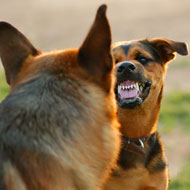Investigation uncovers international dog fighting trade

Animal welfare campaigners are calling for a ‘global crackdown’ on dog fighting.
Animal welfare campaigners are calling for a global crackdown on dog fighting after a BBC investigation revealed an illegal trade of fighting dogs extending from Eastern Europe to Wales.
The investigation built on evidence gathered by the League Against Cruel Sports (LACS), and revealed Bulgarian Ivaylo Nikolov selling and transporting animals to dog fighters.
Because Mr Nikolov shared much of his work on social media, investigators gathered posts suggesting he had sold dogs in at least 29 countries, including the UK.
Secret video footage obtained by the BBC during the investigation showed one dog fight lasting more than an hour. One of the dogs then collapses out of sheer exhaustion and dies the following day.
In another video, Mr Nikolav can be seen arranging a sale, during which he says his contact in Moldova “is actually a state vet in his region” and can supply “any document we want.” He added that “when you travel with Moldovan papers you have too much checks so I have made Bulgarian documents, also blood tests and export certificates.”
The League Against Cruel Sports received 100 reports in 2018 from members of the public about dog fighting in the UK.
Martin Sims, director of investigations at the League, described the sport as ‘a global plague that lurks beneath the surface of apparently civilised societies’.
“This kind of brutality should be a thing of the past but it is very much part of the present,” he said. “The League’s investigation has been a sickening journey into a depraved way of life which has horrendous animal cruelty at its core.
“We’d like to thank the BBC for exposing dog fighting in such a powerful way. Their story shows clearly how this network is linked to dog fighters across the world.
“It’s impossible to know how many dogs are trapped worldwide by dog fighting, but our intelligence suggests it’s in the tens of thousands. We need governments globally to crack down on what is an unacceptable abuse of an animal which puts its trust in humans – but is being betrayed.”
The BBC confronted Mr Nikolov about dog fighting, to which he responded: “I don’t know you, I don’t want to talk to you.” He later shut down his social media accounts and has not responded to any further attempts to contact him.



 RCVS Knowledge has welcomed Professor Peter Cockcroft as editor-in-chief for Veterinary Evidence.
RCVS Knowledge has welcomed Professor Peter Cockcroft as editor-in-chief for Veterinary Evidence.